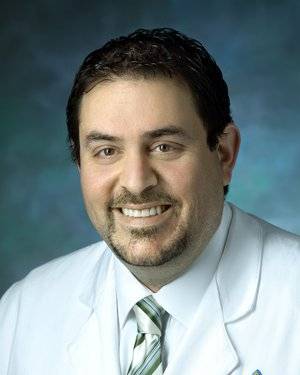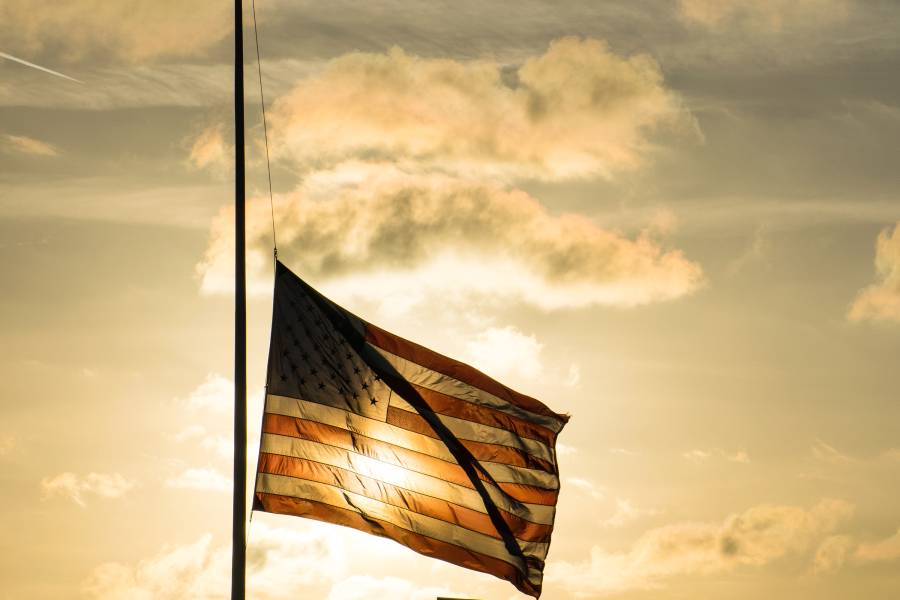When he was 17, a .38-caliber bullet changed the way Joseph Sakran's life would unfold.
While hanging out at a playground after a high school football game, Sakran was struck by a stray bullet from a group of teenagers who had been fighting nearby.

Image credit: Johns Hopkins Medicine
"I went from being this healthy high school teenager to collateral damage," Sakran says. "And I was one of the lucky ones, even though I was left with a carotid injury—you know, damage to one of the main blood vessels running blood to your brain. Even though I was left with a paralyzed vocal cord and a paralyzed phrenic nerve. I was given a second chance. Not everyone gets a second chance."
Inspired by the trauma surgeons who saved his life, Sakran is now an associate professor of surgery, vice chair of clinical operations, and director of emergency general surgery at Johns Hopkins Medicine. He is also the founder of @ThisIsOurLane, a digital movement to unite medical professionals around gun violence prevention advocacy, research, and storytelling.
"As I went down the path of becoming a surgeon, I quickly came to realize both the power of my own story and the importance of working beyond our operating rooms," Sakran says. "Because there's only so much that you can do once someone's been shot in the head—we know how high the case fatality rate is for that. We have to think about preventing these incidents from happening in the first place."
Advocacy is a natural role for a gun violence survivor and trauma surgeon to fill, despite what the National Rifle Association says, he contends. But it's also a role he thinks is appropriate for every American to fill.
"It's not a Democratic issue, it's not a Republican issue—it's a uniquely American issue," he says. "And until we become serious about changing the easy access to firearms in this country, we are going to continue to see these mass murders. We're going to continue to see people on our streets being killed and injured every day. I want us, as communities, as a nation, to have the courage to do the right thing."
The Hub reached out to Sakran the morning after the shooting at Robb Elementary School in Uvalde, Texas, where at least 19 children and two teachers were killed Tuesday when a gunman opened fire in the school.
What's going through your mind today?
I feel terrible. I feel terrible, the way every American should feel. Because today we woke up in America and we're continuing to watch this tragedy that unfolds time and time again. I'm absolutely horrified. I'm angry. I'm heartbroken. And I just refuse to believe that this is the best that we can do. Shame on us.
And yet you're certainly used to seeing victims of gun violence, as a trauma surgeon.
I can tell you the worst part of my job is having to walk into those waiting rooms and tell moms and dads that their son or daughter is never coming home again. In Baltimore, we are seeing young brown and Black men being killed on our streets every day. And, you know, that's the thing about what's happening in the media—people are angry. People are talking about it. But people were also angry 10 days ago when the Buffalo shooting happened. And you saw how quickly the nation forgot as we went from one news cycle to the next.
Image caption: Sakran joins MSNBC's 'Hardball with Chris Matthews' to speak about gun control after a Las Vegas shooting left 61 dead and 867 injured.
These mass shootings constitute the tip of the iceberg when you think about the overall public health problem that we face—where every day, in cities like Baltimore, Philadelphia, and Chicago, we have young Black men being slaughtered on our streets. So yeah, it's hard have to tell families their loved ones have died, and we have to do that way too often, but let's not forget that it's not just about the people who have been killed, but it's also about the nonfatal injuries. We know that in a lot of communities, the recidivism rate can be as high as 41% over five years, meaning you have an opportunity to try to prevent those patients from coming back into your trauma center the next time.
The reality is that we have to think beyond the trauma bay, beyond the operating room, because despite how good we think we are, or despite how incredible our health system is, the best medical treatment is prevention.
You are also the founder of @ThisIsOurLane. What is your mission, and how do you fight for it?
In 2018, when the NRA came out and said that doctors shouldn't be part of the gun violence conversation, we were incensed. We were incensed because, again, we're the ones taking care of these patients. We're the ones that are having to talk to these families. And we're part of the fabric of our society. So it's not just health care professionals who should stand up for gun violence prevention, but every profession should be part of the change that is necessary to protect children and to make communities safer.
We are moving beyond simply the work at the bedside, because we have both the opportunity and the responsibility to do so. For a long time, we've been focused on the data and the science, and data and science are critical;they are what allows us to put into place the right policy and help policymakers understand what the evidence-based practices are. But the data and science alone do not change the hearts and minds of people. Through the @ThisIsOurLane movement, we were able to translate that data into stories—stories of our own experiences, stories of our patients. And that has allowed Americans to see firsthand what we are seeing in our trauma centers.
For far too long, this issue has been sanitized. What we saw in Texas is a massacre; it's the murder of children. It's about time that we stop being so afraid about what people think or how our careers are going to be impacted and be part of the solution. Because otherwise, this is going to remain our reality.
Posted in Health, Voices+Opinion, Politics+Society
Tagged gun policy








